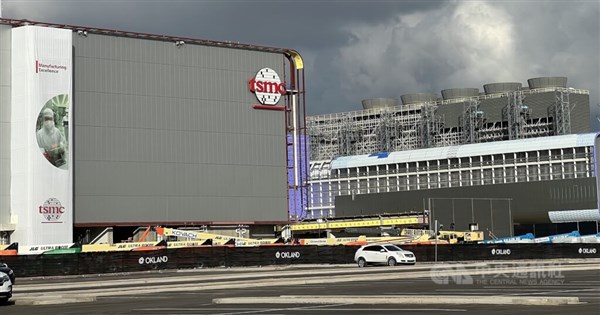Washington, March 28 (CNA) Taiwan Semiconductor Manufacturing Co. (TSMC) is seeking to start construction of its third advanced wafer fab in the U.S. state of Arizona, hoping it will break ground on the facility by next week, a company official has said.
In a forum held by the American think tank Hudson Institute in Washington on Friday, TSMC Vice President for global policy Peter Cleveland said: “We have not started to break ground on our third wafer fab in Phoenix. We would like to start next week.”
Cleveland added that in order to begin construction, the company needed assistance from the U.S. government, such as an environmental permit.
Cleveland also told the forum that while Taiwan remains the “home” for the contract chipmaker, the United States was an “ideal location” for the company to extend its global footprints.
He said that TSMC’s investments in Arizona aim to roll out high-end chips, and “we’re going to build those in Phoenix to sustain the U.S.’s AI leadership.”
TSMC is already investing US$65 billion in Arizona to build three advanced wafer fabs.
The first fab in Arizona has started production using the 4-nanometer process, while the second fab, which will use the more sophisticated 3 nm, 2 nm, and A16 processes, is currently under construction and is expected to begin production in 2028.
The third, of which TSMC has said little to date, is expected to begin production by 2030, using 2 nm or more advanced processes, the company said in April 2024.
On March 3, TSMC announced a pledge to pour an additional US$100 billion into Arizona over the next few years to build three more sophisticated wafer fabs, two IC assembly plants and a research and development center, bringing its total investments in the U.S. state to US$165 billion.
Cleveland admitted, however, that production in the U.S. was not easy.
“The United States is a different marketplace. Labor costs are high,” the TSMC executive said.
But he highlighted TSMC’s “excellent” partnership with Washington, saying the company had a “good dialogue” with the U.S. Department of Commerce about the structural issues.
“We are optimistic about our collaboration and partnership going forward with the Trump administration as well as Capitol Hill,” Cleveland said.
Commenting on the U.S. government’s chip export controls against China, Cleveland said TSMC had good communications with the Trump administration on the complexity of the restrictions.
According to Cleveland, the United States accounts for about 75 percent of TSMC’s business, while its sales to China make up 10 percent.
TSMC needs coordination from the U.S. government to “make sure that our silicon gets sold and distributed in the right ways, consistent with U.S. law,” Cleveland said.
Echoing the TSMC executive, Netherlands-based semiconductor equipment supplier ASML Holding N.V.’s Jonathan Hoganson, who also attended the discussion, said the industry’s companies need the rules to be clearly defined.
(By Elaine Hou and Frances Huang)
Enditem/cs
